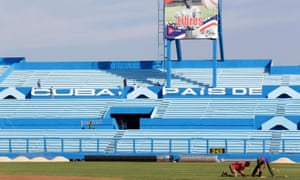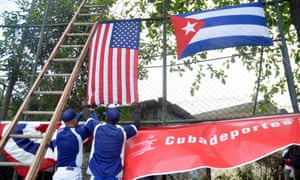Fidel Castro once famously extolled Cuban baseball players to be the standards bearers of the revolution, “playing for the love of people, not money”.
But when Barack Obama winds up his trip to Havana by attending a game between the Cuban national team and Tampa Bay Rays, he will see sport on the island all but ready to be engulfed by a tsunami of Major League dollars.
The US president’s visit to the Estadio Latinoamericano is intended to celebrate a sporting passion that has been shared on both sides of the political divide through decades of conflict. But the game is also likely to herald an opening of sporting ties.
Following the Baltimore Orioles in 1999, the Rays are the only the second Major League team to play in Havana since the Cuban Revolution of 1959. But they come amid a rising tide of interest in the island’s baseball scene, which is financially impoverished but rich in talent.
Earlier this month, Major League Baseball (MLB) submitted a proposal to allow Cuban players to sign directly with US clubs. Tampa Bay has already opened an office in Havana. Other clubs recently held training workshops at Industriales, one of the most popular teams on the island.
While some local fans fear this will accelerate the exodus of Cuba’s best players and coaches, the reality is that – despite the current embargo and local restrictions – the brawn drain has long appeared unstoppable.
Last year about 150 players left Cuba. Many, such as Yulieski Gourriel, one of the world’s highest rated third-basemen, are trying to secure contracts with Major League clubs.
There is no shortage of reasons to leave. Top players get a basic salary of $50 a month. Second-tier squad members often need to get secondary jobs to make a living. Even the most popular clubs suffer shortages of gloves, bats, balls and boxes. Many depend on charitable donations of equipment. Pitches are deplorable. The stadiums are crumbling.
In a bid to stem – or at least tap – the outflow of talent, the Cuban baseball authorities introduced modest market reforms three years ago: the salary cap was lifted, foreign scouts were allowed to visit Cuba and players were allowed to sign for clubs in Canada, Japan, Mexico and Colombia.
It came at a time when the government was experimenting with other forms of liberalisation, such as widening the scope for private business and easing travel restrictions. But in baseball as in the wider economy, the moves created opportunities for individuals but largely failed to strengthen the system as a whole.

“The reforms were too small. They were not what we wanted. We want them to open the door to the Major League so we can come and go and so that American coaches can come here. At the moment, there are still too many restrictions,” said Alejandro Eskenazi, a 26-year-old, right-handed pitcher currently in the reserves of Industriales.
The exodus has continued apace, often illegally, which has exposed players to human smugglers, physical risks and semi-exile from their home nation.
Over the past three years, Eskenazi has seen more than 20 of his former teammates head overseas. Among them was Gourriel, widely rated as Cuba’s best player.
In February, to the shock of many on the island, he and two other players left the Cuban team hotel during an inter-Caribbean tournament in the Dominican Republic. He is now in Haiti and thought to be preparing for a move to the Major League.
As the son of the country’s most famous player, the Cuban authorities had been desperate to hold on to him. They raised his salary 26-fold, but he was still earning less than £700 a month – a tiny fraction of the $50m that he is now likely to secure in a contract in the US.
His plans were widely flagged. In 2013, he told The Guardian he planned to move to Japan and ultimately dreamed of playing in the Major League. But it was harder to share such intentions with teammates.
“We were friends. We talked about many things, but it’s complicated talking about plans to leave,” said Eskanazi of Gourriel. “Nobody wants to discuss that. Some players are informers.”
Ricardo Eizmendiz, a fitness coach for Industriales says it is natural for Gourriel and others to leave not just because of the money but because they want to test themselves against the best. “It is just a pity it has to be hidden because these guys can’t come back,” he said.
Instead, he says the process should be legalised – something he thinks may happen within five years. “If the embargo is lifted and there is an agreement with the Major Leagues, we would get more money for Cuban baseball. We could rebuild stadiums and buy more gloves and equipment,” Eizmendiz said.

The coach points out that Cuba is already on course to overtake the Dominican Republic as the country with the most Major League players. Going a little further, he said, only makes sense.
In the future, players hope such scheming will not be necessary. Ties between Cuban baseball and the Major League are growing. With the help of Antonio Castro, the son of former president Fidel Castro, there are new initiatives to legalise a process that is already under way.
The Major League has backed plans for an organisation to represent Cuban players, baseball officials and entrepreneurs. It would be paid a share of salaries of Major League players, which would then be spent on education and facility improvements, thereby avoiding US embargo stipulations that no money should go to the Cuban government.
If accepted by the US authorities, this could not just widen the doors from Cuba, but also allow players to return back through them. There would be an imbalance, much as there is with Latin American football leagues that currently supply talent to European clubs. But for Eizmendiz, a change would at least mean Cuba gets something back.
“Being a nursery for the Major League wouldn’t be a bad idea,” he said. “This is a good place for that. We Cubans were born to play baseball.”



